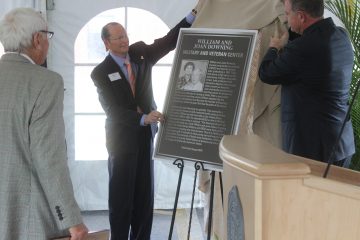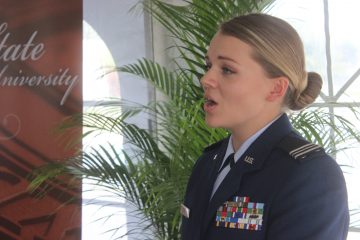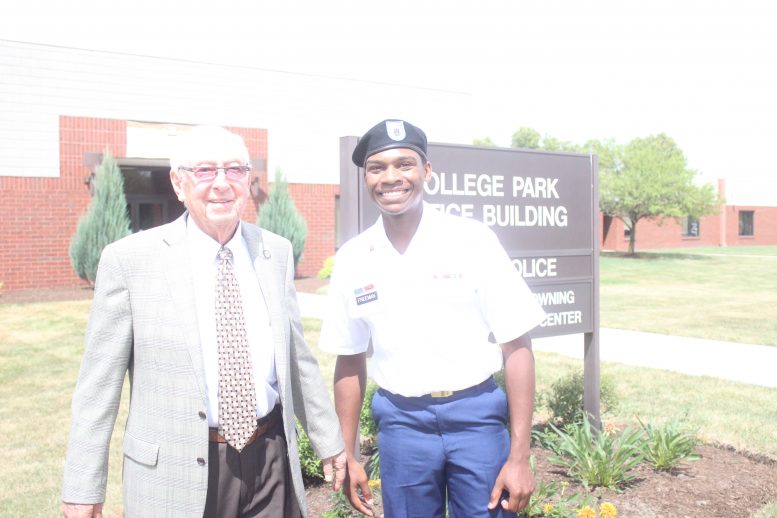By DAVID DUPONT
BG Independent News
When William Downing was discharged from the Navy in 1952, he decided to attend Bowling Green State University.
He’d never been to Bowling Green. He didn’t know anyone there. When asked by his high school principal in Cleveland why BGSU, he explained: “All my buddies went to Ohio U. If I went down there with them I’d never finish.”

Dan Keller, chair of the BGSU Board of Trusteees (center) and President Rodney Rogers unveil replica plaque while William Downing Sr. looks on.
Attending BGSU turned out to be the right move. He did graduate and soon after married Joan, his Falcon flame, whom he met his junior year. The former Navy boxer graduated with a degree in physical education. He taught for a year before going into business. He went on to found Downing Enterprises of Akron.
Growing up on the east side of Cleveland at that time – he graduated from high school in 1948 – “not that many people were going to college.” But the G.I. Bill “set me up,” he said.
Downing said though he didn’t continue his career as a teacher, BGSU gave him the educational foundation to succeed. He wants other veterans and current service members have the same advantages.
On Wednesday BGSU celebrated the gift of $1 million made by Downing and his late wife to their alma mater by dedicating the William and Joan Downing Military and Veteran Center. The business he founded is what made such a legacy gift possible, said his son, William Downing Jr. Both he and his two sisters followed their parents to BGSU.

Cadet Amanda Eckel, of the Air Force ROTC, sings the National Anthem.
Barbara Henry, the director of the Nontraditional and Military Student Services, said the two-pronged approach, scholarships and support for services is “a great way to focus on success.”
The first two scholarships made possible by the Downing gift were announced at the ceremonies.
Keylin Freeman, a major in electronics and computer engineering technology and a member of the Ohio Army National Guard, said the money is a boost.
He joined the National Guard as a medic after one semester at BGSU. His parents, he said, encouraged him to enlist. “They thought it would give me a good form of discipline and responsibility as well as the educational benefits.”
They were right, he said.
Because of his military obligations he ended up having to drop classes, so it’s taken him longer to complete his degree, and he exhausted his military educational benefits.
That’s not unusual for active members of the military, Freeman said. The scholarship means he’ll graduate in another semester after five and a half years without having to take on a large amount of debt.
Still in his time here, he said, he participated in campus life, just as Downing did. He has been a member of the Falcon Marching band, worked as a tour guide, and is a member of the Sigmu Nu fraternity.
He’s also worked in the office for nontraditional and military students helping veterans just arriving on campus make a smooth transition and get acclimated to student life.
“I truly love Bowling Green.”
Henry said 600 veterans and active military members attend BGSU. Of those, 43 percent are veterans, and the rest active duty, some stationed in distance parts of the globe.
The conflicts between an active military schedule were evident at the ceremony. The second scholarship winner Brian Macveigh, also a member of the Army National Guard, was unable to attend because he was away at training.
Downing said that there are challenges facing military students that can’t be explained to others. “I hope that they can grasp everything they can at the university and move forward.”
Downing’s son recalled his father’s time in the service. The elder Downing joined the Navy in 1948, right after graduating from high school. In a time of great patriotism, he wanted to do his part. But it also meant he’d have “three squares a day, a rack at night, and a few dollars in his pocket.” Those were not things, the younger Downing said, that members of a generation that grew up in the Depression and during wartime took for granted.
Downing Sr. joined the boxing team on the aircraft carrier Shangri-La. He told his son he joined the team because he saw that while other sailors worked their regular duties, the team was exercising, training, and sparring, and they got favored treatment in the chow line.
The team competed in matches against other military teams when they reached port as well as in Golden Gloves competitions. Downing earned the nickname “Whirling Willie” for his abilities.
He told his son: “I was a skinny kid growing up in a tough, poor Cleveland neighborhood. If I wanted to keep my lunch money, I had to fight, and I got pretty good at it.”
When not in the ring, he was a boatswain’s mate taking pride in how clean he and his crew could keep their assigned area of the deck.
His children got a taste of that. When they wanted to go to a movie or visit a friend, their father would say: “As long as your decks are clean and clear, you can go.”
Freeman said he was proud to learn that he would be getting a scholarship named after Downing. “Your story is very inspiring,” he told him during the ceremony.
Freeman’s grandfather also was a Korean Era veteran. Freeman said Downing and his grandfather are the people “I strive to live like every day.”

